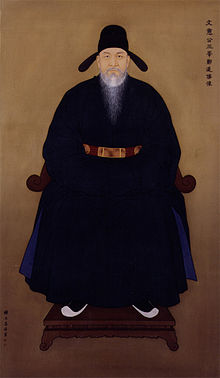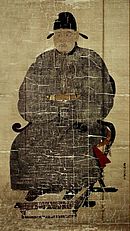- Jeong Do-jeon
-
First Prime Minister in Joseon Dynasty 
The Portrait of Jeong Do-jeonKorean name Hangul 정도전 Hanja 鄭道傳 Revised Romanization Jeong Dojeon McCune–Reischauer Chŏng Tojŏn Pen name Hangul 삼봉 Hanja 三峰 Revised Romanization Sambong McCune–Reischauer Sambong Courtesy name Hangul 종지 Hanja 宗之 Revised Romanization Jongji McCune–Reischauer Chongji Jung Do-jun (korean:정도전, hanja:鄭道傳, 1337(?) or 1342(?) – 1398), also known by the pen name Sambong(삼봉), was the most powerful medieval Korean aristocrat and politician in the early Joseon dynasty. He was also an influential Neo-Confucian ideologue and was the closest supporter and advisor to King Taejo, who founded the Joseon dynasty. After Taejo became the first king of Joseon, he left all state affairs to Jeong Dojeon, making him the most powerful and influential man who shaped 500-year-long Joseon dynasty by laying down its idealogical, institutional, and legal foundations. It is even said by some historians that Jeong Dojeon founded Joseon through Taejo, rather than the other way around.
Contents
life
Background and early career
Jeong Dojeon was born from a noble family in Chungcheongbuk-do Danyanggun, Sambong, in the present-day of South Korea. His family had emerged from commoner status some four generations before, and slowly climbed up the ladder of government service. His father was the first in the family to obtain a high post. Unfortunately Jeong's mother was his concubine, which made it very difficult for him to gain power in his early days. Despite all his difficulties, he became a student of Yi Saek and with other leading thinkers of the time such as Jeong Mong-ju, his penetrating intelligence started to effect Korean politics.
Relationship with Yi Seonggye
Jeong's ties with Yi Seonggye and the foundation of Joseon, were extremely close. He is said to have compared his relationship to Yi to that between Zhang Liang and Gaozu of Han. Jeong's political ideas had a lasting impact on Joseon Dynasty politics and laws. The two first became acquainted in 1383, when Jeong visited Yi at his quarters in Hamgyong province. After Taejo founded Joseon in 1392, he appointed Jeong to the highest civilian and military office simultaneously, entrusting him with all necessary power to establish the new dynasty. Deciding all policies from military affairs, diplomacy, and down to education, he laid down Joseon's political system and tax laws, replaced Buddhism with Confucianism as national religion, moved the capital from Gaeseong to Hanyang (present-day Seoul), changed the kingdom's polical system from fedualism to highly centralized bureaucracy, and wrote a code of laws that eventually became Joseon's constitution. He even decided the names of each palace, eight provinces, and districts in the capital. He also worked to free many slaves and reformed land policy.
Conflict with Yi Bangwon
After Joseon was established in 1392, he soon collided with Yi Bang-won over the question of choosing the crown prince, future successor to Taejo. Of all princes, Yi Bang-won contributed most to his father's rise to power and expected to be appointed as the crown prince even though he was Taejo's fifth son. However, Jeong Dojeon persuaded Taejo to appoint his young, eight son Yi Bang-seok (Yi Bang-won's half-brother) as the crown prince. Their conflict arose because Jeong saw Joseon as a kingdom led by ministers while the king was to be largely symbolic figure where as Yi Bang-won wanted to establish the absolute monarchy ruled directly by the king. Both sides were well aware of each other's great animosity and were getting ready to strike first. After the sudden death of Queen Sindeok in 1398, while King Taejo was still in mourning for his second wife, Yi Bang-won struck first by raiding the palace and killed Jeong Do-jeon and his supporters as well as Queen Sindeok's two sons including the crown prince in a coup that came to be known as the First Strife of Princes. Taejo, who helplessly watched his favorite sons and ministers being killed by Yi Bang-won's forces, abdicated in disgust and remained angry with Yi Bang-won well after Yi Bang-won became the third king of Joseon, Taejong.[citation needed]
For much of Joseon history, Jeong Dojeon was vilified or ignored despite his contribution to its founding. He was finally rehabilitated in 1865 in recognition of his role in designing Gyeongbokgung (main palace). Earlier Jeongjo published a collection of Jeong Dojeon's writings in 1791. Jeong Dojeon's once-close friend and rival Jeong Mong-ju, who was assassinated by Yi Bang-won for remaining loyal to Goryeo Dynasty, was honored by Yi Bang-won posthumously and was remembered as symbol of loyalty throughout the Joseon dynasty despite being its most determined foe.
Intellectual activity
Jeong Dojeon was a major opponent of Buddhism at the end of the Goryeo period. He was a student of Zhuxi's thought. Using Cheng-Zhu Neo-Confucian philosophy as the basis of his anti-Buddhist polemic, he criticized Buddhism in a number of treatises as being corrupt in its practices, and nihilistic and antinomian in its doctrines. The most famous of these treatises was the Bulssi Japbyeon ("Array of Critiques Against Buddhism" ). He was a founding member of the Seonggyungwan, the royal Confucian academy, and one of its early faculty members.
Jeong was among the first Korean scholars to refer to his thought as silhak, or "practical learning." However, he is not usually numbered among the members of the Silhak tradition, which arose much later in the Joseon period.
Political thought
Jeong argued that the government, including the king himself, exists for the sake of the people. Its legitimacy could only come from benevolent public service. It was largely on this basis that he legitimized the overthrow of the Goryeo dynasty, arguing that the Goryeo rulers had given up their right to rule.
Jeong divided society into three classes: a large lower class of agricultural laborers and craftsmen, a middle class of literati, and a small upper class of bureaucrats. Anyone outside this system, including Buddhist monks, shamans, and entertainers, he considered a "vicious" threat to the social fabric.
References
- Han Yeong-u. (1974). Jeong Do-jeon's philosophy of political reform. Korea Journal 14(7-8). Reprinted in Lee et al. (2004), Korean philosophy: Its tradition and modern transformation, pp. 55-74. Seoul: Hollym. ISBN 1-56591-178-4
- Korean Institute of Philosophical Thought. (1995). 강좌 한국철학 (Gangjwa Hanguk Cheolhak, Guide to Korean philosophy), pp. 333-345. Seoul: Yemoon Seowon. ISBN 89-7646-032-4.
See also
- List of Korean philosophers
- Korean philosophy
- Korean literature
- Joseon Dynasty politics
- Jeong Mong-ju
site link
Categories:- Joseon Dynasty people
- Goryeo people
- Korean philosophers
- Korean Confucianists
- People murdered in Korea
- Korean revolutionaries
- Korean educators
- Neo-Confucianism
- Critics of Buddhism
- Korean literature
- People from Yeongju
- 1342 births
- 1398 deaths
Wikimedia Foundation. 2010.

